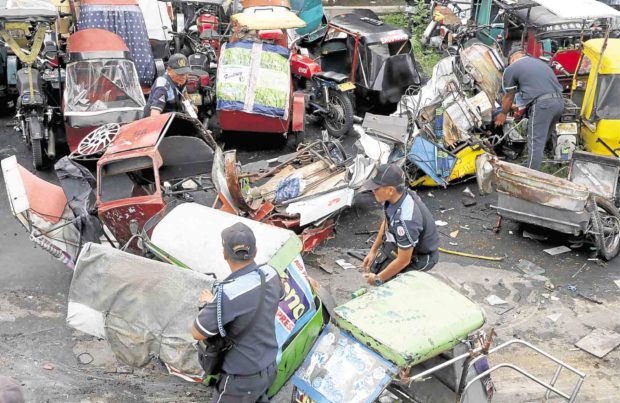DSWD chief, Kadamay hit QC destruction of trike sidecars

A payloader crushes “colorum” sidecars seized by the Quezon City government on Aug. 2. —Photo courtesy of the QC Public Affairs Dept.
The Quezon City government’s “one-strike” policy against unregistered tricycles — which last week saw about 80 confiscated sidecars destroyed in front of their owners — has drawn criticism not only from urban poor groups but also from Social Welfare Secretary Judy Taguiwalo.
“Smashing tricycle sidecars with a payloader is too harsh a punishment for people who only want to earn a decent living,” Taguiwalo said in a statement on Wednesday.
Taguiwalo noted the difference in the way the government had been dealing with “colorum” tricycles and with unauthorized Grab or Uber vehicles.
More compassionate way
“(The tricycle drivers) may have violated the law by operating without a permit from the local government, but just recently we learned that several thousand transport network vehicle services (under Uber or Grab) operate without permits as well. Will they (penalize) the drivers and operators of these TNVS the same way?” the Cabinet official said.
Article continues after this advertisement“There has to be a better, more productive, not to mention compassionate way to address these issues without resorting to the destruction of property of the poor and working people,” she said.
Article continues after this advertisementBefore City Hall adopted a one-strike policy, it confiscated colorum tricycles only after repeated offenses. The violation carries a P3,000 fine.

Judy Taguiwalo —MALACAÑANG PHOTO
Taguiwalo said she would be speaking with Quezon City Mayor Herbert Bautista regarding possible livelihood programs for drivers affected by “the harsh implementation of the law.”
Also on Wednesday, about 30 members of urban poor group Kadamay staged a protest rally in front of City Hall to denouncing the policy for being “antipoor” and the destruction of the sidecars “an overkill.”
Michael Beltran, Kadamay spokesperson, said the local government must encourage the drivers to register their tricycles instead of punishing them for making ends meet.
“The city government must adopt more pro-people processes and introduce incentives for these people who are from the informal sector,” he told the Inquirer.
Mayor defends policy
Sought for comment, Mayor Herbert Bautista said his office remained open to Kadamay’s suggestions to resolve the issue.
“The policy is an act requested by the 26,000 legal franchise holders, tricycles and operators who belong to the same urban poor sector,” he said in a text message to the Inquirer.
On the possible lifting of the moratorium on tricycle franchise, Bautista said the route measure capacity, which is the basis for the issuance, was “still sufficient.”
Vice Mayor Joy Belmonte stressed that the ordinance went through several public consultations and that information about the measure had been widely disseminated since its approval in 2014.
“This means that colorum [drivers] were given ample time to either legitimize themselves in underserved areas or to find alternative livelihood,” she said.